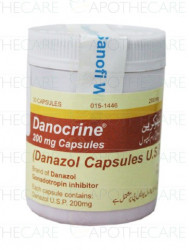Danocrine (danazol) Coupons, Discounts & Cost
Danocrine (danazol) is a drug that inhibits gonadotropin secretion. One way to save money on the Danocrine (danazol) retail cost regardless of income and insurance status is to use Danocrine (danazol) coupons or discount cards from RXCoupons. Use our Danocrine (danazol) coupons at your online pharmacy and receive up to 75% off the sale price each time you refill your prescription.
Danocrine (danazol) pharmacological properties
Danocrine (danazol) is a drug that inhibits gonadotropin secretion. Danazol suppresses ovarian activity, inhibits ovulation, and causes atrophy of the endometrium (it affects both normal and ectopic endometrial tissue). When used in high doses, it has a weak androgenic activity.
Danazol is used to treat endometriosis (a disease that causes infertility), premenstrual stress syndrome, pain during menstruation, hereditary angioedema, fibrocystic breast disease or other benign breast conditions, primary menorrhagia, gynecomastia.
What are the contraindications for Danocrine (danazol)?
The main contraindications for Danocrine (danazol): - Carcinoma; - Androgen-dependent tumors; - Mammary cancer; - Vaginal bleeding of unknown etiology; - Severe liver or kidney problems; - Chronic heart failure; - Thromboembolic disorders; - Pregnancy and breastfeeding; - Children and elderly patients; - Hypersensitivity to danazol.
Caution is recommended for patients with kidney or liver problems, disorders of the cardiovascular system (including hypertension), epilepsy, diabetes, lipid metabolism disorders, polycythemia, migraine.
Pregnancy should be excluded in women of childbearing age. Danazol is not a contraceptive. Therefore, patients should use non-hormonal methods of contraception during treatment.
Danazol should be used in combination therapy with anticonvulsant and anticoagulant agents.
Danocrine (danazol) dosage and administration
The dosing regimen should be set for each patient individually. The maximum daily dose for adults is 800 mg. Menorrhagia: take 100-400 mg a day for 3 months. Endometriosis: the first dose is 400 mg per day. The dose can then be increased to 800 mg (for 6 months). Mastitis: take 300 mg per day. Gynecomastia in men: 200-600 mg per day. Angioedema prevention: the initial dose is 200 mg during 1-3 months. Symptoms of early puberty in children: 100-400 mg daily (depending on the age and condition of the patient).
Danocrine (danazol) side effects
Danocrine (danazol) may cause the following side effects: Endocrine system: amenorrhea, sweating, changes in libido, vaginitis, nervousness, emotional lability, overactive sebaceous glands, acne, mild hirsutism, androgenic alopecia, weight gain, edema. Nervous system: dizziness, headache, tremor, weakness, depression, sleep disorders, visual disturbances, emotional lability, paresthesia, muscle spasms, anxiety. Digestive system: functional disorders of the gastrointestinal tract; rarely - cholestatic jaundice. Metabolism: impaired glucose tolerance. Cardiovascular system: rarely - hypertension, tachycardia. Dermatological reactions: skin rash. Other reactions: spasms or muscle cramps, back pain; rarely - visual impairment. Overdose: tremors, convulsions, nausea, headache, vomiting, dizziness. Treatment is symptomatic.
Danocrine (danazol) special instructions
Danocrine (danazol) increases the level of testosterone in the blood. Patients with diabetes should change the dose of insulin.
Patients of childbearing age should use a pregnancy test before treatment (to confirm the absence of pregnancy). Treatment should be started on the first day of menstruation. It is recommended to use non-hormonal contraception during the period of treatment.
It is possible to use danazol in the treatment of children with abnormally early onset of puberty.
Danocrine (danazol) interactions
Danazol increases the effect of coumarin anticoagulants (high risk of bleeding). The drug affects carbohydrate metabolism and weakens the action of oral hypoglycemic agents and insulin.
Danazol increases the concentration of glucagon, cyclosporine and tacrolimus (high risk of nephrotoxicity). The drug inhibits the metabolism of antiepileptics (such as phenytoin, carbamazepine, phenobarbital).
Danazol may reduce the effect of antihypertensive drugs. The drug may cause hypercalcemia (when combined with alfacalcidol in primary hypoparathyroidism).

